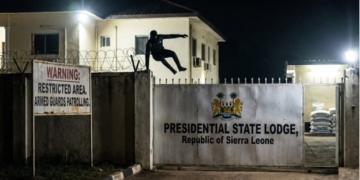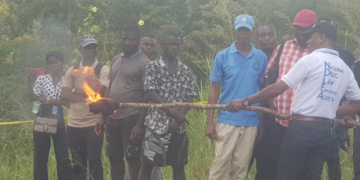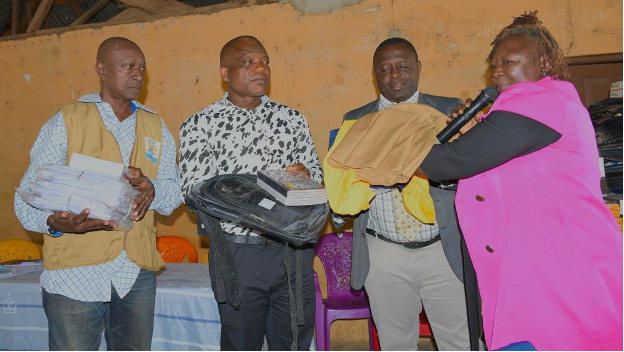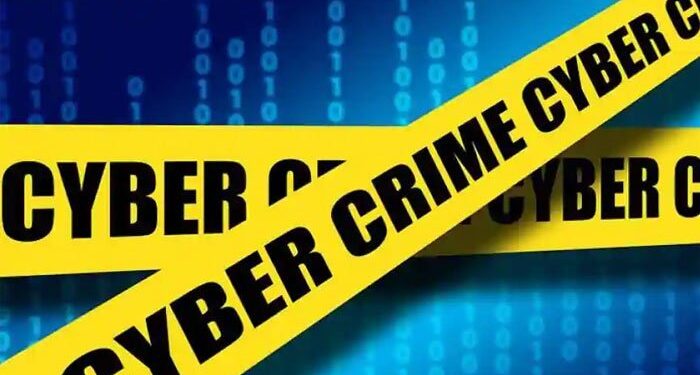By Alpha Amadu Jalloh
There are laws that protect a nation’s dignity, and there are laws that betray it. Sierra Leone’s Cyber Crimes Act falls tragically into the latter. It was passed with the promise of protecting citizens from online fraud, harassment, and misinformation, but what it has become is something more sinister, a carefully designed legal trap to silence critics, muzzle journalists, and criminalize freedom itself. The Cyber Crimes Act, as it stands, is not a shield against cyber criminals; it is a sword pointed at every citizen holding a phone, a pen, or a conscience.
When the government of Sierra Leone introduced the Cyber Crimes Act, many celebrated it as a step toward modernity, a move to align with global standards of digital regulation. But beneath the legal jargon and patriotic speeches hides a piece of legislation that threatens the very foundation of free speech, journalism, and civic participation. This law, if not challenged, will transform Sierra Leone into a nation where owning a smartphone is a potential crime and where speaking truth to power could cost you fifteen years of your life.
Let’s walk through what this law really means for journalists, activists, and ordinary citizens.
Section 3 of the Act makes it an offence to access someone’s phone or computer without authorization. On the surface, that seems fair because privacy must be respected. But the ambiguity of the law is dangerous. Who defines “authorization”? If a journalist receives leaked documents from a government insider or screenshots exposing corruption, is that not technically accessing someone’s data without permission? The law’s vague wording could easily turn an investigative journalist into a criminal facing five years in prison simply for doing their job.
> “Every person shall be entitled to freedom of expression, including freedom to hold opinions and to receive and impart ideas and information without interference.”
Section 25(1), Constitution of Sierra Leone (1991)
Section 4 goes further, criminalizing the modification, deletion, or obstruction of someone’s data, again punishable by five years imprisonment. Imagine a journalist editing a video to protect a source’s identity or cropping a picture to remove sensitive details, that could be interpreted as modifying data. Under this law, ethical journalism becomes criminal conduct, and journalistic discretion becomes an offence.
But it is Section 5 and Section 6 that strip the mask off the law’s real intentions. Section 5 criminalizes communicating “critical information” to someone not authorized to receive it, an offence carrying fifteen years imprisonment. Section 6 criminalizes even possessing such “critical information.” The law never clearly defines what “critical information” means. Is it national security intelligence? Is it evidence of corruption? Is it a government report exposing mismanagement? When laws are written with ambiguity, they are meant to be abused.
> “Everyone has the right to freedom of opinion and expression; this right includes freedom to hold opinions without interference and to seek, receive and impart information and ideas through any media and regardless of frontiers.”
Article 19, Universal Declaration of Human Rights (1948)
Every journalist in Sierra Leone should understand that these sections are not about protecting the nation; they are about protecting those in power. A journalist who uncovers evidence of a minister stealing public funds and sends that to a media outlet could be charged for communicating critical information. A whistleblower with evidence of police brutality could be jailed for possessing critical information. This is not justice; it is legal tyranny disguised as cybersecurity.
Section 10 makes it a crime to record private conversations, even if you are part of the conversation, punishable by two years imprisonment. This is absurd. How can you criminalize recording your own conversation? Imagine a journalist interviewing a corrupt official who later denies the conversation ever took place. Without a recording, truth has no proof; with a recording, the journalist faces two years in prison. This provision doesn’t protect privacy; it protects lies.
> “Every individual shall have the right to receive information and the right to express and disseminate his opinions within the law.”
Article 9, African Charter on Human and Peoples’ Rights (1981)
Then comes Section 19, which makes it an offence to publish misleading information, punishable by two years imprisonment. But who determines what is misleading? The same politicians who lie daily to the people? The same officials who manipulate statistics and invent successes that don’t exist? When the government becomes the sole judge of truth, freedom dies. This section effectively empowers politicians to decide which stories are misleading, a clear invitation to censorship.
Section 21 reaches new heights of absurdity. It makes it a crime, punishable by five years imprisonment, to disclose that you have received a police call-out or summons related to cyber crime. In simple terms, if a journalist is arrested under this law and tells the public or posts on social media that they have been called by the police, that disclosure itself becomes another crime. The act of saying you have been accused becomes an additional accusation. This is not just a legal trap; it is the architecture of fear.
Section 22 criminalizes being rude, indecent, or vulgar online with intent to humiliate, carrying two years imprisonment. But what defines rudeness or humiliation? If a citizen calls out a corrupt politician for stealing public funds, could that be seen as humiliation? Under this section, satire becomes a crime, criticism becomes vulgarity, and holding power accountable becomes defamation.
Section 24 caps it all. It classifies attempts to incite ethnic divisions as domestic terrorism punishable by life imprisonment. No decent person supports tribal hate, but the danger lies in the government’s interpretation. In Sierra Leone’s political culture, any form of criticism can be twisted into “incitement.” If a journalist exposes nepotism, favoritism, or discrimination in public appointments, it could be labeled ethnic incitement. This section turns national unity into a political weapon, and those in power will decide when to use it.
> “Every person shall have the right to freedom of assembly and association.”
Section 26(1), Constitution of Sierra Leone (1991)
The drafters of this law have betrayed the conscience of the nation. They claim to protect Sierra Leone from cyber criminals, but in truth, they are protecting their own corruption from exposure. They have turned the internet, the last refuge of the poor, the powerless, and the truth-teller, into a battlefield where words are crimes and thoughts are punishable.
A Historical Echo of Suppression
The Cyber Crime Act mirrors the same oppressive spirit that lived in the Public Order Act of 1965 and the Police Act of 1965. These two colonial-era laws gave the police excessive power to arrest, detain, and silence anyone deemed “disruptive” or “offensive.” Journalists who published reports that embarrassed the government were routinely detained. The Public Order Act’s infamous Part V criminalized libel, turning truth into treason.
While the Public Order Act targeted the press through ink and paper, the Cyber Crime Act extends that repression into the digital age. Both laws were crafted with the same intention: to control information and protect the political elite. The only difference is the medium, one silenced the printing press, the other handcuffs the smartphone.
Even the Police Act of 1965, which empowers officers to arrest on suspicion and maintain public order, has often been abused to intimidate protesters and restrict the freedom of assembly. Together, these laws reveal a disturbing continuity, a government that fears its citizens more than it serves them.
> “All persons shall be entitled to freedom of conscience, of expression, of assembly, of association, and of movement.”
Preamble, Constitution of Sierra Leone (1991)
The Cyber Crimes Act is not just dangerous; it is shameful. It criminalizes curiosity, punishes expression, and suffocates accountability. It is the most dishonest piece of legislation since independence because it attacks not cybercrime, but the right to know, the right to speak, and the right to dissent.
Even the president himself is not beyond the reach of this law. If tomorrow a journalist records his speech and shares a portion that the government deems “critical information,” he too could technically be in violation. This is how dangerous and ridiculous the Cyber Crimes Act is; it places every Sierra Leonean, including those who enacted it, under permanent suspicion.
The Act’s biggest victims will be the journalists, activists, and ordinary citizens who dare to think differently. The free press will be reduced to whispers, online debate will become a risk, and truth will live in exile. In a country already struggling with unemployment, corruption, and youth frustration, these laws are not tools of governance; they are tools of suppression. They push the country closer to fear, not freedom.
But perhaps the most frightening aspect of this law is that it normalizes silence. It teaches the people to self-censor, to doubt their own voice, and to stay quiet even when the truth burns within them. A nation that silences its journalists is a nation that blinds itself. When truth becomes contraband, lies become law.
The Sierra Leone Association of Journalists (SLAJ) and civil society must rise to challenge this abomination. This is not just about journalism; it is about the survival of democracy. The right to information is not a privilege granted by the state; it is a birthright of every citizen. When the state criminalizes truth, it is no longer a government; it is an enemy of the people.
History will remember not those who drafted these laws, but those who resisted them. The drafters of the Cyber Crimes Act have written their names in the dark pages of Sierra Leone’s legislative history. They have told us, through their silence and dishonesty, that freedom is dangerous and truth is treason. But no law, no matter how cruel, can imprison the human spirit forever.
Sierra Leone’s journalists must keep writing, speaking, and exposing, even if the price is high. Because when the law becomes unjust, disobedience becomes a duty.
The Cyber Crime Act is not about cyberspace. It is about control. It is not about crime. It is about fear. And the people of Sierra Leone, if they still value freedom, must decide whether they will continue living as suspects in their own country or rise to reclaim the voice that this law is trying to bury alive.























